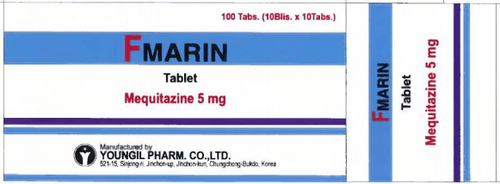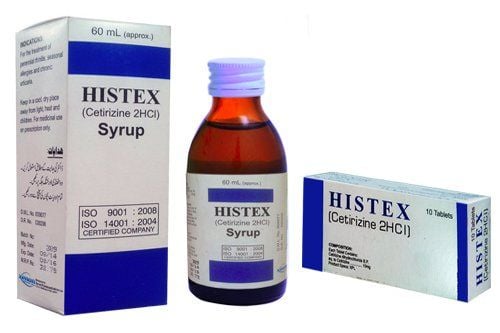This is an automatically translated article.
Sneezing, runny nose, itchy nose, watery eyes, ... are manifestations of seasonal allergic rhinitis. To get rid of these unpleasant symptoms, the patient needs to use the appropriate allergy medicine for sneezing and runny nose.
1. What is seasonal allergic rhinitis?
Allergic rhinitis is an immune disease, caused by allergens (also called allergens) when they enter the body through the nasal mucosa. Allergic rhinitis has many forms, including: perennial rhinitis, occupational rhinitis and seasonal allergic rhinitis.
Seasonal allergic rhinitis is also known as seasonal allergic rhinitis. This is an allergic rhinitis that lasts from year to year, the time of onset of symptoms often depends on the season of occurrence of allergens such as: Blooming season of a certain plant, caterpillar breeding season, cold dry season or wet season mold growth,...
Common symptoms in patients with seasonal allergic rhinitis are:
Sneezing: When sick, the patient often sudden episodes of sneezing. When the weather is cold or there is a sudden change, the patient will sneeze more. In addition, the patient may have a headache due to muscle spasms when sneezing; Itchy nose: A common symptom in children. In addition, the patient sometimes also has itching in the eyes, throat, outer ear canal or the skin of the neck; Runny nose: A common initial symptom in people with seasonal allergies, often runny nose on both sides of the nose (mostly transparent, odorless). However, after a while, due to superinfection, the nasal discharge becomes more cloudy. The phenomenon of runny nose often appears after the sick person sneezes; Nasal congestion: People with seasonal allergies often have a stuffy nose on one or both sides of the nose due to mucosal edema and runny nose. Therefore, patients often have to breathe through their mouth, leading to dry mouth; Body fatigue: People with seasonal allergic rhinitis often feel tired, sluggish, have headaches, and have impaired mental and physical work capacity. If not treated promptly and aggressively with seasonal allergy medications, the patient may experience a number of problems such as:
Blocked or runny nose leading to difficulty sleeping, daytime sleepiness, fatigue, discomfort, difficulty concentrating when studying or working; Seasonal allergic rhinitis makes asthma symptoms (coughing, wheezing,...) worse; Prolonged inflammation can lead to other diseases such as nasal polyps, otitis media, sinusitis, ... Therefore, when there are symptoms of seasonal allergic rhinitis, patients should quickly use all kinds of medicines. allergy medicine weather sneezing runny nose suitable.
2. Which allergy medicine for sneezing, runny nose should be used?
Treatment depends on the severity of the symptoms and how much it interferes with the patient's daily activities. In most cases, the treatment is aimed at relieving the symptoms of the disease such as sneezing, stuffy nose, runny nose, etc.
So what medicine is used for seasonal allergies? If you have mild seasonal allergic rhinitis, you can usually self-treat with over-the-counter medications in consultation with your pharmacist. In case of more severe symptoms, affecting quality of life, patients need to see a doctor directly to be prescribed appropriate treatment.
Some types of allergy medicine for seasonal allergies, sneezing, and runny nose are often prescribed, including:
2.1 Antihistamines Patients with seasonal allergies can use antihistamines such as: Loratadin, Cetirizine, Fexofenadine, Levocetirizine, .. Use 1 time/day. Over-the-counter Loratadine can be used in children 2 years of age and older, Cetirizine is indicated for children over 6 years of age. At the same time, the patient should regularly clean the nose with saline solutions.
With antihistamine sprays (such as Azelastine) are only available by prescription. It is recommended that patients start taking the drug about 2-3 weeks before the disease season. This is an alternative medicine for children over 5 years old and the elderly. When using seasonal allergy nasal spray, the patient should pay attention to keep the head straight, avoid letting the medicine spread down the throat because it can cause discomfort. In addition, because antihistamines can cause drowsiness, patients should avoid drinking alcohol while taking them.
Some older generation antihistamines can cause anticholinergic effects such as blurred vision, urinary retention, dry mouth, constipation,... In very high concentrations, these drugs can cause stimulant effects. central nervous system, common in children.
Note: Antihistamines are absolutely contraindicated for glaucoma patients. At the same time, caution should be exercised when using the drug in patients with liver disease or prostate enlargement.
2.2 Decongestants Decongestants also belong to the group of allergy medications that are necessary for many patients. These drugs work to reduce congestion, relieve symptoms of nasal congestion, runny nose. They contain active ingredients such as Ephedrine, Phenylephrine, Oxymetazoline, Pseudoephedrine and Xylometazoline, ... with the effect of constricting dilated blood vessels in the nasal mucosa, helping to clear the nose effectively.
Patients can use this drug orally or topically. Tablets, syrups are taken orally, nasal sprays or nasal drops are used topically. If using topical drugs, they should not be used for more than 7 days because prolonged use can cause drug-induced rhinitis.
2.3 Steroid Anti-Inflammatory Nasal Sprays Beclomethason, Budesonid, Fluticasone nasal sprays... can be indicated for the treatment of seasonal allergic rhinitis. Steroid nasal sprays are the routine treatment of choice for moderate to severe allergic rhinitis with persistent, persistent symptoms such as nasal obstruction or nasal polyps. These sneezing, runny nose allergy medications can reduce the symptoms of inflammation caused by an allergic response. While corticosteroids take longer than antihistamines to work, they last longer.
When using Steroid nasal spray, patients need to use the drug regularly throughout the disease to achieve the best treatment effect. Side effects of inhaled corticosteroids are very rare, if any are usually dry, nasopharyngeal irritation, nosebleeds.
Note: Clomethason and Beclomethason nasal sprays can be used by people over 18 years of age for up to 3 months. It is not recommended to use this drug in patients with Glaucoma and pregnant women. In addition, for patients with a particularly severe episode of allergic rhinitis, doctors may assign patients to use a short course of corticosteroid tablets lasting about 5-10 days.
2.4 Antibiotics Antibiotics are used only in cases where the patient has a superinfection of allergic rhinitis caused by bacteria, which has been prescribed by a doctor. Commonly used antibiotics are Cephalosporin, Sulfamide,... in case the patient has multiple recurrent superinfections or the bacteria show signs of drug resistance.
3. Measures to avoid recurrence of seasonal allergic rhinitis
Using allergy medicine for sneezing and runny nose is an effective treatment for the disease. However, prevention is better than cure. To prevent disease from the root, the best way is for each person to note:
Regularly clean toys, blankets, curtains, furniture covers,...; Pets should not be allowed into the bedroom or living space, should be washed at least twice a week and need to regularly clean the items that the pet has come into contact with; Wear sunglasses that protect your eyes from pollen; keep your doors closed mid-morning and early evening - a time when there's a lot of pollen in the air; People with allergies should shower, wash their hair and change clothes after coming back from outside; avoid areas with many blooming flowers,... If you need to go to places with many allergens, people with sensitive skin should wear a mask; Keep the house dry and ventilated, avoid storing clothes in damp cabinets. Families can use air purifiers and dehumidifiers to reduce humidity and help clean indoor air; Do not dry clothes, blankets outdoors during times of high pollen because pollen can stick to these items and cause allergies; Boost your immune system by eating a nutritious diet, taking extra vitamins, and drinking enough water. At the same time, each person needs to build a habit of going to bed early, getting enough sleep and exercising appropriately; Protect the ear, nose and throat by gargling, rinsing the nose regularly, especially during the change of seasons. Seasonal allergic rhinitis is a benign disease caused by allergens from the external environment. The disease can be controlled by using allergy medicines. However, the best measure is that people with sensitive terrain need to actively stay away from pathogens, strengthen the body's immunity,...













